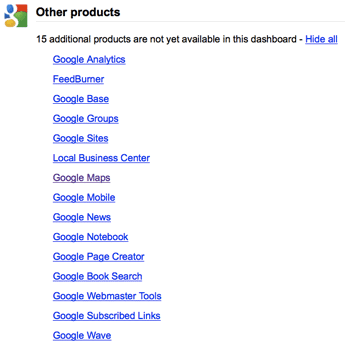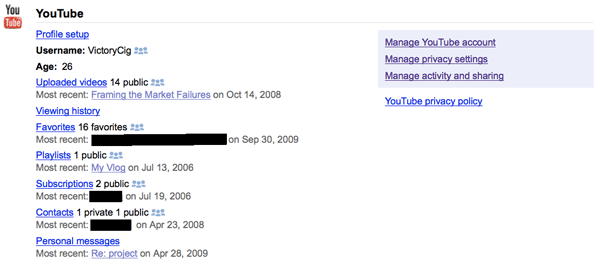Google Dashboard Is Only a Small Step Towards Data Collection Transparency
Google is on the defensive in recent months, facing threats of antitrust action from the Obama administration, a concerted public smear campaign by Microsoft, and growing concern from its users over its panoptic and ubiquitous services. In an attempt to allay these concerns and convince Washington it isn't evil, Google has created Dashboard, a tool that brings many of a user's privacy settings and content from Google products onto one page. But while Google markets it as a powerful tool to manage one's privacy, the seemingly extensive Dashboard actually presents users with a limited set of the total personal data Google collects.
Google presents Dashboard as a service to provide users "with greater transparency and control over their own data." The Internet giant wrote on its official blog, "The scale and level of detail of the Dashboard is unprecedented," and claimed to be the first Internet company to provide such a tool.
Though their acquisition of startups and competitors has slowed during the recession, Google continues to turn out new products and services, and add features to existing ones. Their power and reach online is undoubtedly growing, and it is difficult to use the Internet without leaving some personal data on at least one of Google's widely used platforms: YouTube, Blogger, Gmail, and of course, Google search. Services like Google Analytics and DoubleClick collect information from every visitor, regardless of whether or not they have a Google Account, and Google sets tracking cookies that can potentially build a history of sites visited, news articles consumed, products researched, etc.
In this context, it becomes clear the Dashboard informs users of an extremely limited set of information that Google collects from them: only that data which users have voluntarily provided Google's various services while logged into their Google Accounts (and not all Google services are included on Dashboard yet). The Dashboard does not include information collected via cookies and tracking scripts about users' browsing habits and history.
 No, you can't have a Wave invite.
No, you can't have a Wave invite.
Dashboard is not, as TechCrunch writes, a tool "to show just how much Google knows about you." (In fact, without creating a Google Account, it is currently impossible to learn what Google knows about you, or perhaps more fairly, what Google knows about your computer at your IP address.) Dashboard is actually an enhanced version of the Google Accounts page that each Google user has. In addition to the list of Google services one uses (which the Accounts page already provides), the Dashboard includes a brief summary of the user's personal data associated with each service, an indicator of whether that data is publicly accessible, and links to manage privacy preferences and other settings for those services.
 Icons indicate which data is publicly visible.
Icons indicate which data is publicly visible.
Although it is limited, the Dashboard is still useful. While researching this article, I saw some of my personal data stored on YouTube was marked as public, and thanks to the adjacently placed link to YouTube's privacy settings, I corrected that quickly. Users will likely be surprised to see some long forgotten data is still publicly visible, or alternately that a feature recently added to a favorite Google product has created and revealed data that was previously nonexistent (as was the case for me).
Users can do more than just visit the Dashboard if they are concerned with protecting their privacy against tracking and other invasions by Google. Most importantly, users can install the Advertising Cookie Opt-out Plugin to permanently disable the DoubleClick tracking cookie on their machines, preventing Google from following their clicks across sites. This plugin is only compatible with Firefox, Safari and Chrome, so go tell your mom to stop using Internet Explorer. Users can additionally visit the company's Privacy Center to read privacy policies for Google products and watch videos explaining these policies. Finally, for those who have decided to expatriate themselves from Googletropolis, Google has a site dedicated to data portability. The cleverly named Data Liberation Front outlines methods for removing one's data from Google products.
Google is taking a step in the right direction with the Dashboard and its documentation. But the fact that Dashboard presents to users only a small fraction of the total data Google collects from them has been lost in the company's own marketing and recent media coverage. It can be difficult to discuss online privacy issues without being either alarmist and paranoid or, conversely, dismissive and blasé. The goal of any such discussion should be to provide clear and accurate information that helps users understand privacy risks and empowers them to protect themselves.

